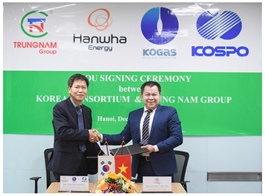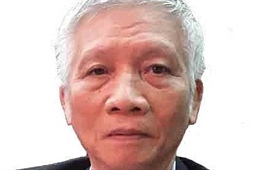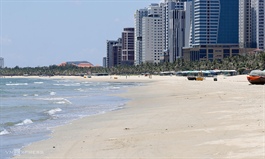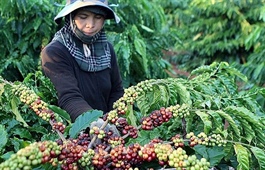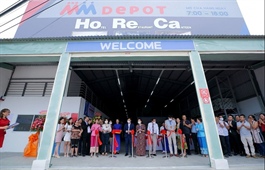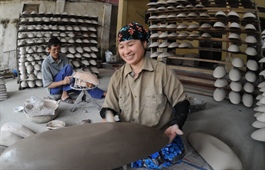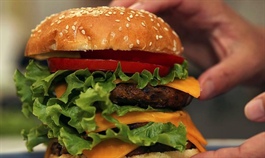Nestlé Vietnam realizes sustainable development goals
Nestlé Vietnam realizes sustainable development goals
On the sidelines of the Vietnam Corporate Sustainability Forum 2020 held in Hanoi on December 10, Mr. Binu Jacob, CEO of Nestlé Vietnam and co-chair of the Vietnam Business Council for Sustainable Development (VBCSD), talked about sustainable development in an interview with Vietnam Economic News’ reporter.
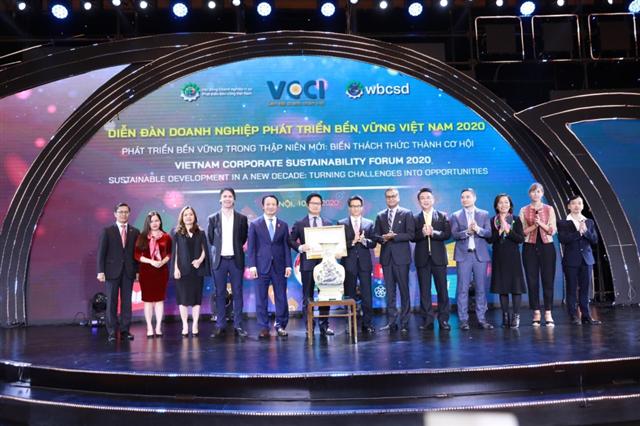
Deputy Prime Minister Vu Duc Dam (seventh from the left) presents the Prime Minister’s certificates of merit to representatives from the VCCI-VBCSD Standing Board
|
How sustainable development was incorporated into the core business value of Nestlé Vietnam?
At Nestlé, we define sustainable development as the process of increasing the world’s access to higher quality food, while contributing to long-term socioeconomic development and preserving the environment for future generations.
Over the last 150 years, Nestlé has always focused on doing the right things and long term. We believe when you do the right things to the society, people, the government and the community, business results will come.
With “Creating Shared Value”, Nestlé works closely with partners in Vietnam to make positive contributions to the society, while ensuring long-term success in business. If you want to be sustainable, you must attach a vision to the future. That is how we maintain and develop relationships with distributors, suppliers, farmers and related agencies to share the success with the viewpoint: We only grow indeed when our partners grow together.
And as I mentioned to the VBCSD, regenerative sustainability as the newest turn in Nestlé’s sustainability philosophy. This thinking has only taken root in the company in recent months as the next step in sustainability. The basic premise of sustainability is “Do not take more than what you can give back”, but the world has gone through such a catastrophe that even if all companies come on board, this will not be enough. The challenge of regeneration is tipping the balance back by finding our way into a cycle where resources are automatically regenerated and renewed.
The idea of regenerative agriculture has been making the rounds for some time now and as the world’s largest food company, we believe we have the scale to make a tangible impact by supporting this trend.
What has Nestlé Vietnam done to realize sustainable development goals?
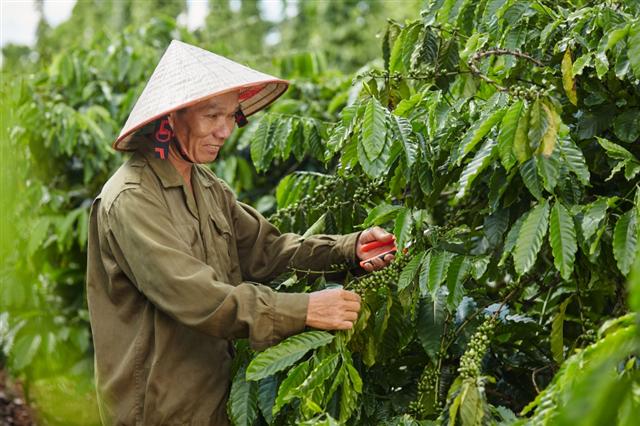
Nestlé Vietnam has helped coffee growers improve productivity and income through the sustainable coffee initiative Nescafé Plan
|
In Vietnam, we are working with farmers to support them in implementing regenerative agriculture practices. The sustainable coffee initiative Nescafé Plan launched 10 years ago, has so far distributed more than 46 million plantlets of high-yielding and disease-resistant coffee varieties to growers in the five Central Highlands provinces of Dak Lak, Dak Nong, Gia Lai, Lam Dong, and Kon Tum. This has helped to renew over 46,000ha of aged and low-productive coffee areas and provides strong support to the government’s coffee rejuvenation program. This helps protect the natural environment through reducing irrigated water usage by 40 percent and chemical fertilizer and pesticide use by 20 percent.
After a decade, Nescafé Plan has supported more than 21,000 coffee farms to achieve the 4C, the Common Code for the Coffee Community, certification. In return, we are purchasing 20-25 percent of the country’s total coffee output. We also support local communities by injecting around US$600-US$700 million per year into the rural economy through coffee purchases.
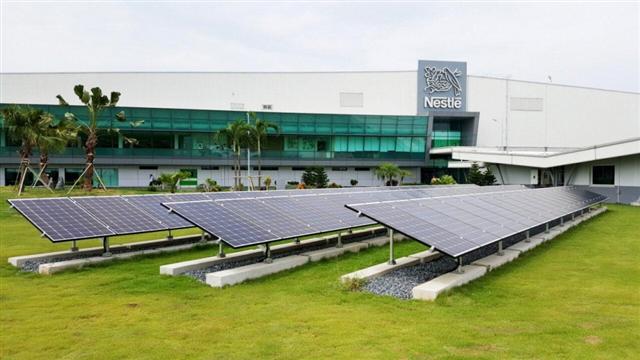
Nestlé has announced its detailed, time-bound plan to halve the company’s emissions by 2030 and to achieve net zero by 2050
|
We have adopted renewable energy for all production sites which has been contributing to a reduction of 60 percent in CO2 emissions in the past 10 years.
All of the company’s factories have also achieved the “Zero Waste to Landfill” goal since 2017, meaning that nothing leaving the factories goes to the landfill. In this process, we applied initiatives such as using coffee husk as fuel, ash as fertilizer, waste for making bricks, and wastewater for watering, among others to increase renewable energy.
Nestlé aims to recycle and reuse all products’ packaging. What are your solutions to achieve the goal?
We have a full plan of recycling and reusing 100 percent of our product packaging towards 2025.
Each of our markets has a specific roadmap that contributes to the global target. For instance, as a leading food and beverage group, creating a circular economy for plastics is a key concern in our operations. In Vietnam, we realized that we have to partner. So about a year and a half back, we partnered with key industry leaders to form the Packaging Recycling Organization Vietnam (PRO Vietnam) and have been getting more partners on board to promote recycling.
PRO provides a set of activities to push collecting and recovering packaging waste, engaging local recyclers, formal and informal collectors, and junk shops towards having zero packaging leakage into the environment.
We will continue to base sustainability practices on the Sustainable Development Goals (SDGs) set out by the United Nations with a vision towards 2030. The SDGs cover a wide range of issues, from environmental protection and climate change to social equality, poverty reduction, and food waste treatment.
These efforts, more than anything, will showcase our commitment to the long-term, sustainable growth of Vietnam, staying true to its “Creating Shared Values” slogan.
La Vie, our brand under Nestlé Group, has just launched a new product bottled in food-grade recycled plastic (rPET), helping minimize the use of virgin plastics, but also give change for each collected bottle to be reborn, encouraging sorting, collecting and recycling projects in Vietnam.
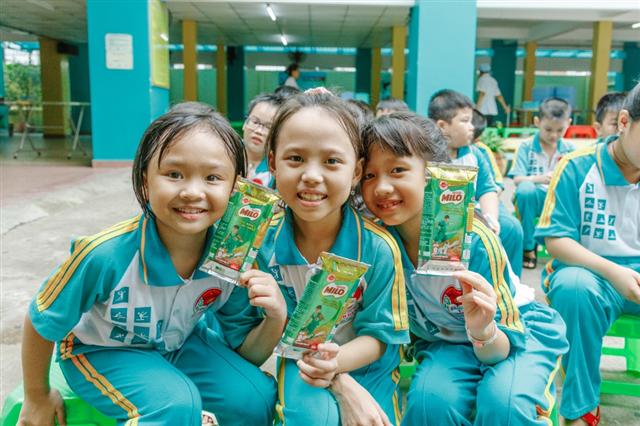
Nestlé Vietnam has supported and encouraged a healthy lifestyle and frequent physical activity in the community
|
What are your recommendations to achieve sustainable development?
The VBCSD is among the most reputable organizations in Vietnam, and consistently takes an active role in encouraging the business community to do their part in setting the country on a solid path to sustainable development. It has been a great pleasure and honor for both me and Nestlé Vietnam to have a chance to collaborate with VBCSD members to share and learn best practices to broaden our contribution to such a meaningful journey.
This ties in wonderfully into the role we would like to take up in the business community: Nestlé Vietnam aims to be a catalyst of change. We cannot change the world on our own, but we can show good example and encourage our suppliers, partners, and consumers to follow suit.
We believe that by sharing experiences and practical lessons, businesses can thrive together to accomplish the set goals. The business community should be part of solutions to sustainability.
Public-private partnership (PPP) in the field of sustainable development is no longer a trend, but indispensable to achieve the optimal results. Each party should be active in giving opinions and promoting cooperation for sustainable development. VBCSD was formed with the desire and principles to better promote the role of the business community and make the parties closer.
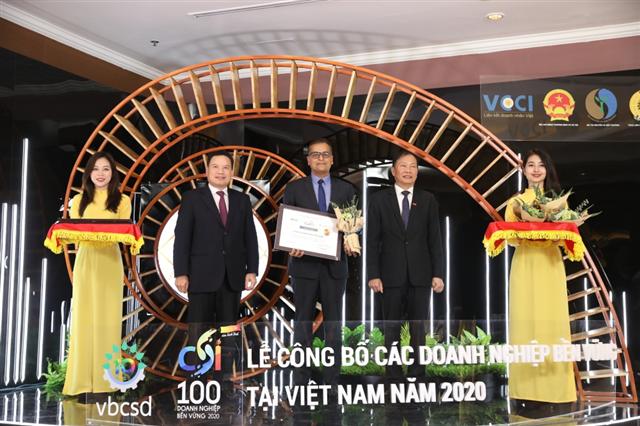
Binu Jacob (middle), CEO of Nestlé Vietnam, receives the certificate from Deputy Minister of Labor, War Invalids and Social Affairs Le Van Thanh for Nestlé Vietnam for being Top 3 most sustainable corporation in 2020
|
|
Nestlé ranks Top 3 most sustainable corporation in 2020 We are very proud to announce that Nestlé Vietnam has been honored as ‘Top 3 Most Sustainable Company in 2020’ by VBCSD. This year, Nestlé Vietnam moved up from Top 10 (2018 and 2019) to Top 3 thanks to our significant contributions to Vietnam’s sustainable development. Earlier in the day at the annual conference for sustainable development hosted by VCCI-VBCSD and attended by Vietnamese Deputy Prime Minister Vu Duc Dam, Nestlé was the only company invited to share our best practices on sustainable development. |





